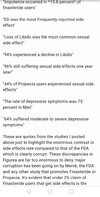The bottom line here is that yes, there are risks associated with finasteride. It can be argued back and forth for eons on what exactly the incidence and severity of those risks are. With that said, at this point in time it's literally the only thing we have with proven long term efficacy with the exception of dutasteride. The information label should be updated as more data emerges, but I don't think banning it outright makes any sense at this point in time.
It's important to remember that not all statistics are created equally. While drug manufacturer's have a financial incentive to produce favorable side effect profiles for the purpose of marketing, the studies conducted on PFS are heavily flawed. They're also misinterpreted frequently. For example, this study gets thrown around a lot.

onlinelibrary.wiley.com
They sampled 54 people who already complained about persistent side effects from finasteride and found that 96% of people still have sexual side effects after 14 months. I've seen some people claim that 96% of people will exhibit persistent side effects after discontinuing finasteride. That wasn't even what this study attempted to show, it simply shows that the people who already complain of persistent side effects may continue to have persistent side effects after 14 months. The study is also retrospective and has a biased sample selection, meaning you can't establish a clear association between finasteride and persistent sexual side effects to begin with.
This is a trend with (unless I missed something) all of the studies conducted on PFS. The quality of the evidence is very low, and it doesn't support an action as drastic as banning the medication for all hair loss indications, especially when there are so many people that are benefiting from it.
The PFS foundation itself cites this study (
https://peerj.com/articles/3020/) to try and establish an incidence of PFS, and the number they cite is 1.4%. This study is also retrospective though, which makes it difficult to clearly establish a link between finasteride and persistent ED. That, and the number seems to be 0.8%, so it seems that they may have misinterpreted the study itself.
Unless there is a properly conducted clinical trial that provides clear evidence of the incidence and risk factors of PFS, I don't think it makes any sense whatsoever to ban it. If you read about the medication and decide that it's not worth the risk, then don't take it. It's as simple as that.

